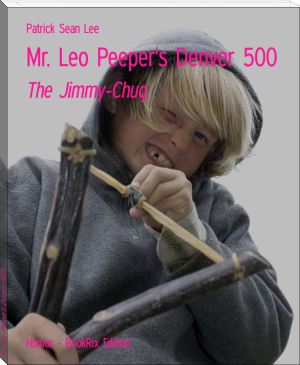The Head of Kay's by P. G. Wodehouse (romantic story to read .txt) 📗

- Author: P. G. Wodehouse
Book online «The Head of Kay's by P. G. Wodehouse (romantic story to read .txt) 📗». Author P. G. Wodehouse
One genius suggested that they might kill two birds with one stone—snub Kennedy and pay a stately compliment to Fenn by applying to the latter for leave to go out of bounds instead of to the former. As the giving of leave "down town" was the prerogative of the head of the house, and of no other, there was a suggestiveness about this mode of procedure which appealed to the junior dayroom.
But the star of the junior dayroom was not in the ascendant. Fenn might have quarrelled with Kennedy, and be extremely indignant at his removal from the headship of the house, but he was not the man to forget to play the game. His policy of non-interference did not include underhand attempts to sap Kennedy's authority. When Gorrick, of the Lower Fourth, the first of the fags to put the ingenious scheme into practice, came to him, still smarting from Kennedy's castigation, Fenn promptly gave him six more cuts, worse than the first, and kicked him out into the passage. Gorrick naturally did not want to spoil a good thing by giving Fenn's game away, so he lay low and said nothing, with the result that Wren and three others met with the same fate, only more so, because Fenn's wrath increased with each visit.
Kennedy, of course, heard nothing of this, or he might perhaps have thought better of Fenn. As for the junior dayroom, it was obliged to work off its emotion by jeering Jimmy Silver from the safety of the touchline when the head of Blackburn's was refereeing in a match between the juniors of his house and those of Kay's. Blackburn's happened to win by four goals and eight tries, a result which the patriotic Kay fag attributed solely to favouritism on the part of the referee.
"I like the kids in your house," said Jimmy to Kennedy, after the match, when telling the latter of the incident; "there's no false idea of politeness about them. If they don't like your decisions, they say so in a shrill treble."
"Little beasts," said Kennedy. "I wish I knew who they were. It's hopeless to try and spot them, of course."
XI — THE SENIOR DAYROOM OPENS FIRE
Curiously enough, it was shortly after this that the junior dayroom ceased almost entirely to trouble the head of the house. Not that they turned over new leaves, and modelled their conduct on that of the hero of the Sunday-school story. They were still disorderly, but in a lesser degree; and ragging became a matter of private enterprise among the fags instead of being, as it had threatened to be, an organised revolt against the new head. When a Kay's fag rioted now, he did so with the air of one endeavouring to amuse himself, not as if he were carrying on a holy war against the oppressor.
Kennedy's difficulties were considerably diminished by this change. A head of a house expects the juniors of his house to rag. It is what they are put into the world to do, and there is no difficulty in keeping the thing within decent limits. A revolution is another case altogether. Kennedy was grateful for the change, for it gave him more time to keep an eye on the other members of the house, but he had no idea what had brought it about. As a matter of fact, he had Billy Silver to thank for it. The chief organiser of the movement against Kennedy in the junior dayroom had been the red-haired Wren, who preached war to his fellow fags, partly because he loved to create a disturbance, and partly because Walton, who hated Kennedy, had told him to. Between Wren and Billy Silver a feud had existed since their first meeting. The unsatisfactory conclusion to their encounter in camp had given another lease of life to the feud, and Billy had come back to Kay's with the fixed intention of smiting his auburn-haired foe hip and thigh at the earliest opportunity. Wren's attitude with respect to Kennedy gave him a decent excuse. He had no particular regard for Kennedy. The fact that he was a friend of his brother's was no recommendation. There existed between the two Silvers that feeling which generally exists between an elder and a much younger brother at the same school. Each thought the other a bit of an idiot, and though equal to tolerating him personally, was hanged if he was going to do the same by his friends. In Billy's circle of acquaintances, Jimmy's friends were looked upon with cold suspicion as officious meddlers who would give them lines if they found them out of bounds. The aristocrats with whom Jimmy foregathered barely recognised the existence of Billy's companions. Kennedy's claim to Billy's good offices rested on the fact that they both objected to Wren.
So that, when Wren lifted up his voice in the junior dayroom, and exhorted the fags to go and make a row in the passage outside Kennedy's study, and—from a safe distance, and having previously ensured a means of rapid escape—to fling boots at his door, Billy damped the popular enthusiasm which had been excited by the proposal by kicking Wren with some violence, and begging him not to be an ass. Whereupon they resumed their battle at the point at which it had been interrupted at camp. And when, some five minutes later, Billy, from his seat on his adversary's chest, offered to go through the same performance with anybody else who wished, the junior dayroom came to the conclusion that his feelings with regard to the new head of the house, however foolish and unpatriotic, had better be respected. And the revolution of the fags had fizzled out from that moment.
In the senior dayroom, however, the flag of battle was still unfurled. It was so obvious that Kennedy had been put into the house as a reformer, and the seniors of Kay's had such an objection to being reformed, that trouble was only to be expected. It was the custom in most houses for the head of the house, by right of that position, to be also captain of football. The senior dayroom was aggrieved at Kennedy's taking this post from Fenn. Fenn was in his second year in the school fifteen, and he was the three-quarter who scored most frequently for Eckleton, whereas Kennedy, though practically a certainty for one of the six vacant places in the school scrum, was at present entitled to wear only a second fifteen cap. The claims of Fenn to be captain of Kay's football were strong, Kennedy had begged him to continue in that position more than once. Fenn's persistent refusal had helped to increase the coolness between them, and it had also made things more difficult for Kennedy in the house.
It was on the Monday of the third week of term that Kennedy, at Jimmy Silver's request, arranged a "friendly" between Kay's and Blackburn's. There could be no doubt as to which was the better team (for Blackburn's had been runners up for the Cup the season before), but the better one's opponents the better the practice. Kennedy wrote out the list and fixed it on the notice board. The match was to be played on the following afternoon.
A football team must generally be made up of the biggest men at the captain's disposal, so it happened that Walton, Perry, Callingham, and the other leaders of dissension in Kay's all figured on the list. The consequence was that the list came in for a good deal of comment in the





Comments (0)